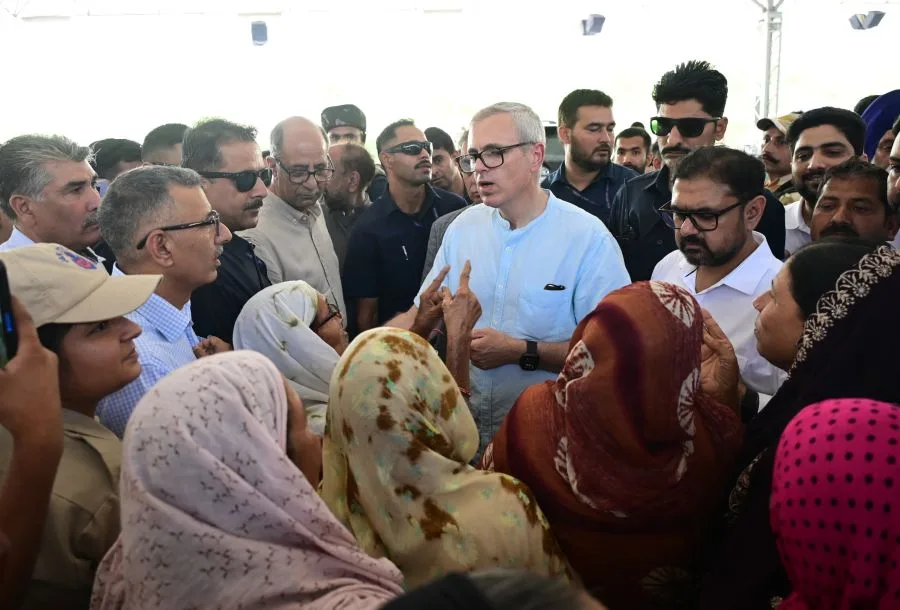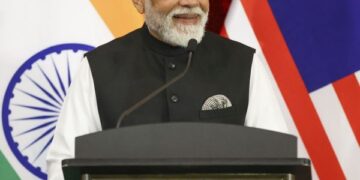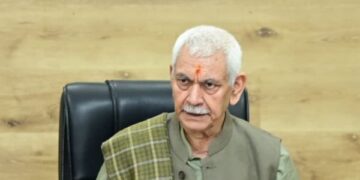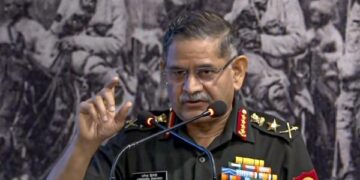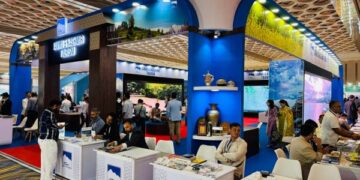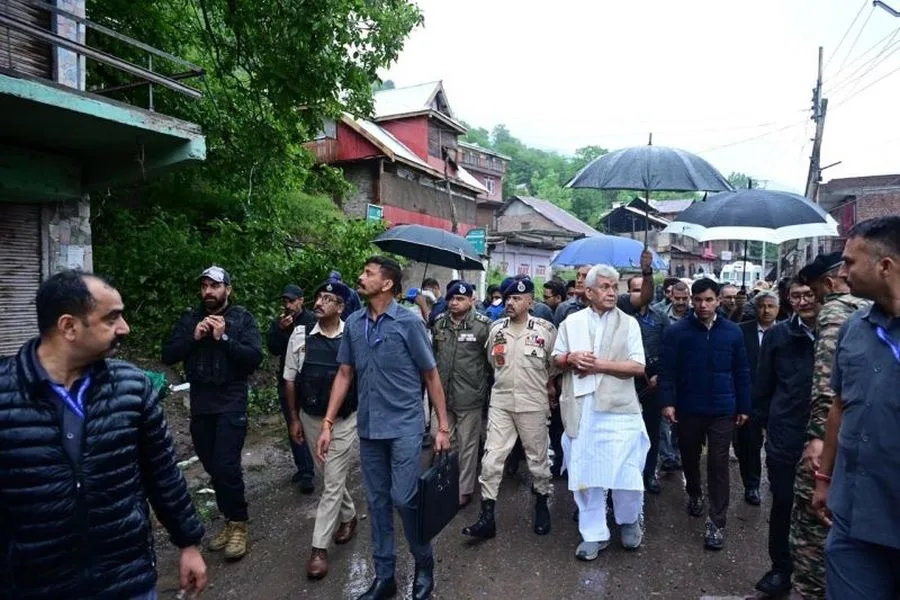Jammu, May 9: Warning Pakistan that continued escalation from across the border would only hurt them, Chief Minister Omar Abdullah called Thursday’s aerial strikes on Jammu one of the “most serious assaults” on the city since the 1971 war.
He said that Pakistan should focus on de-escalation amid the ongoing military conflict in the wake of Operation Sindoor.
The chief minister lauded the armed forces for their swift response in neutralising aerial threats and ensuring that not a single drone reached its intended target.
“The way civilians have been targeted, and the kind of attacks carried out in Jammu city—I don’t think Jammu has been targeted like this since the 1971 war,” Abdullah told reporters in Vijaypur during his visit to relief camps and a hospital in Jammu and Samba districts.
He added that multiple locations in Jammu, and even an ammunition depot in Anantnag, were among the targets, but all attempts failed.
Abdullah on Thursday strongly condemned the recent wave of cross-border strikes through drones, missiles and shelling in the Jammu and Poonch districts.
Clarifying the current situation, the chief minister said, “We did not create this situation. Our people were attacked in Pahalgam, and innocent civilians were killed. We had to respond.”
He warned that continued escalation from across the border would only hurt Pakistan.
“This continuous escalation from Pakistan’s side benefits no one. Pakistan gains nothing from this, nor will they succeed. They should silence their guns and help normalise the situation here,” he said.
He further counselled them, saying they should act wisely and focus on de-escalation rather than escalation.
Referring to the back-to-back attacks the previous night, he said “What happened last night—first around 9 pm, then again at 4:30 am—clearly shows an attempt to escalate. But they will be the ones to suffer the most.”
The chief minister highlighted the situation in Poonch as the most critical. “There was heavy damage in Poonch city. Most of the casualties and injuries are from there,” he said.
“I just visited the hospital in Jammu, and all the admitted patients are from Poonch. One critically injured person was shifted to PGI Chandigarh for surgery today,” he added.
He said his deputy chief minister is trying to reach Poonch to meet the affected families.
During his visit to camps at Mishriwala, Nagbani, Kot Bhalwal in Jammu district and Vijaypur in Samba, he interacted with displaced families and assured them of full government support.
“I assured them that my government stands firmly with them in these difficult times,” he said, adding that he had directed officials to ensure all necessary facilities are provided without delay.
“All necessary facilities have been arranged at the camps—two meals a day, tea, medical care, and sanitation. Doctors, ambulances, and transport services are all in place,” Abdullah said.
Acknowledging the discomfort faced by the displaced, he added, “I know this is not an ideal situation and they want to return home. But we had no choice but to bring them here. We are doing our best to minimize their inconvenience.”
He also shared a lighter moment from the visit, mentioning that some children had asked for play equipment, and “I am thankful to our minister, who brought it in his own vehicle and handed it over to them.”
Later, the chief minister visited a Government Medical College Hospital in Jammu to inquire about the well-being of the injured and prayed for their swift recovery.
He also reviewed the situation following the recent drone attacks across the region.
CM emphasizes on ensuring public safety, maintaining unity
Reviews relief measures, preparedness with DCs of border districts
Chief Minister Omar Abdullah held interaction with civil society members here today to discuss steps taken for public safety, state of preparedness and the importance of maintaining communal harmony during these critical times.
According to an official press release, during the interaction, the Chief Minister urged the public to remain calm and vigilant, appealing to citizens not to panic and to rely solely on verified and official sources of information.
Minister Satish Sharma, Advisor to the Chief Minister Nasir Aslam Wani, Deputy Commissioner Jammu, Senior Superintendent of Police Jammu, Director Social Welfare Department Jammu, Director Food, Civil Supplies & Consumer Affairs Jammu, Regional Transport Officer Jammu, senior police officers and other concerned officers were also present during the interaction.
Stressing the importance of effective communication, he outlined a set of measures aimed at enhancing public awareness and strengthening the emergency response mechanism across the region.
The Chief Minister informed the participants that safety guidelines and verified updates would be disseminated through the Department of Information using local television, radio channels and an official WhatsApp channel.
He also emphasized the role of the Traffic Department in raising awareness about emergency alert sirens and signals. The deployment of police personnel in sensitive areas was discussed as a means to manage panic and assist with crowd control, while designated relief camps, functional bunkers, and healthcare facilities are being kept in a state of readiness.
The meeting was informed that in order to ensure the uninterrupted supply of essential commodities, the government is maintaining the supply chain and regulating prices. Fire services, ambulances, and Civil Defence units have been placed on high alert to ensure a swift and coordinated emergency response.
The Chief Minister reiterated the administration’s commitment to maintaining communal harmony and urged community leaders to play a proactive role in fostering peace and unity.
Special attention is also being given to the safety and care of livestock in affected areas. The Health Department has been directed to keep hospitals and primary health centres fully prepared for emergencies and that a dedicated helpline was now active for patients in need of life-saving drugs or dialysis. Blood donation camps are being organized in collaboration with NGOs to meet medical requirements on the ground.
Chief Minister Omar Abdullah concluded the session by expressing gratitude to the civil society members for their participation and support. He reaffirmed the government’s unwavering commitment to protecting the lives and well-being of every citizen during this time of crisis.
The interaction saw participation from a broad spectrum of civil society members, including ex-servicemen, former police chiefs of the J&K Police, heads and presidents of industry & commerce, trade and travel associations, former ministers and representatives of various political parties. Educationists, academicians, stakeholders from the tourism sector, heads of religious organizations representing Hindu, Muslim, Sikh, and Christian communities, representatives of Gujjar and Bakarwal groups, lawyers’ bodies, fruit and mandi associations, transporters and NGOs were also present.
The participants appreciated the Chief Minister for convening such an interaction at a time of heightened tensions.
They pledged their full support under the leadership of Chief Minister Omar Abdullah and affirmed their commitment to standing united with the government during the ongoing crisis.
Abdullah also chaired a comprehensive review meeting to assess the ongoing relief measures, evacuation of civilians being undertaken across border districts in the wake of recent cross-border shelling.
The Chief Minister spoke with Divisional Commissioner Kashmir, Vijay Kumar Bidhuri, who briefed him on evacuation efforts and transport arrangements in Kashmir Division. He informed that essential commodities such as food, healthcare service and also recreation activities for children have been arranged in the shelter camps. Nodal Officers have also been deployed for seamless coordination of facilities in these camps.
Deputy Commissioners of various border districts apprised the Chief Minister about the ground situation, including evacuation planning, medical preparedness, public outreach and availability of essential supplies. It was informed that identification of vulnerable villages, number of displaced persons had been assessed and provision of shelter, food, medicines and awareness material is being provided, including use of video and audio messaging to inform and alert the public. It was conveyed that Control rooms have been made functional in the affected districts and Standard Operating Procedures are being followed.The details of security arrangements made and deployment for public safety were given in the meeting.
The Chief Minister had a discussion with the Principal Government Medical College Jammu regarding the availability of medical personnel, infrastructure and ambulance services in case of emergencies.
Emphasising the importance of swift and reliable communication with the public, the Chief Minister directed that effective communication be maintained at the grassroots level to ensure timely and accurate dissemination of vital information.
He also emphasised that solar lights in border villages be turned off during blackouts as part of standard security protocols.
He further inquired about the availability and utilisation of contingency funds at the district level and instructed that items required urgently must be procured promptly without delay and for the benefit of the affected population.


